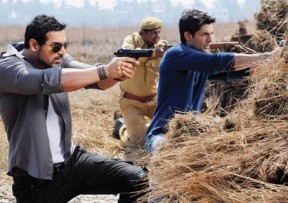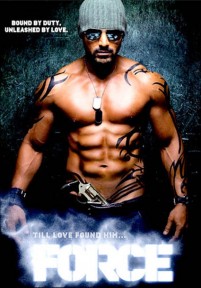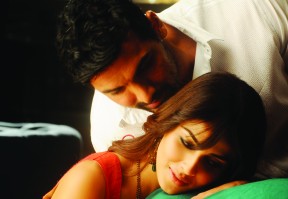The world of Hindi films is largely driven by money and stars with a big following. Quite obviously the stakes are dangerously high when big films featuring big stars hit the screen. They may not deserve the hype that surrounds their releases but every media platform is milked dry to promote a lavishly mounted film. Stars who do not have this much clout may aspire to be box-office busting solo heroes like Shahid Kapoor did with Mausam and John Abraham is now attempting to do with Force but observe how grudgingly their ‘big’ ambitions are treated by certain sections of the media.
If Aamir Khan bulks up for Ghajini, it is national news but John bulking up to play a virtually invincible narcotics cop in Force will be dismissed with a shrug and labelled boring. No one in the industry is insecure when small films get great reviews or when a Nishikant Kamat makes Mumbai Meri Jaan but if he makes Force, a possible pan-Indian hit in the league of Ghajini or Dabbang, watch the manner in which certain reviews will dismiss the film. Though Abraham’s first two films Jism and Saaya amply showed us his sensitive side, his ability to connect with the heart of a role, he has been studiously dismissed as a bad actor and even in Force, though his role requires him to play an emotionally inert cop, he is expected to suddenly display histrionics though none of the money raking stars are called limited actors even when they play themselves ad- infinitum. In film after film after film.
The fact that someone with Nishikant Kamat’ sensibilities is directing Force, right away establishes that this is not a film trying to turn the action genre into a quick buck. And that there is thought, structure and the investment of craft in a routine story about crime and retribution. There is a certain level of honesty in the narrative that cuts through the blood and gore and connects with you far more successfully than Dum Maro Dum, a film in the same genre. That scene for instance when ACP Yashvardhan tells Maya (Genelia D’Souza) that their is no sad, back story to justify his ferocious single-mindedness to his job.
And in a country where parents just want their kids to win reality shows and become stars, who will do the dirty work of cleaning the country if not a few men like him? Or when he asks if following the law is tantamount to letting innocents die, giving statements to mourn them and then trying to hunt down those responsible. And how fair it is to suspend a cop for killing a known criminal when a criminal follows no rules and is treated to State hospitality till he is convicted. Or when he says that every young reveller who buys cocaine at a Mumbai nightclub may just be sponsoring an attack on the CST or Taj without knowing it.
There are moments also of lingering warmth shared by the officers and their loved ones as they try to lead normal lives away from the very real danger that stares them in the face every day. Sandhya Mridul and Mohnish Behl play strong cameos as do the solid actors who form part of the tightly knit anti-narcotics group. There is the perky Genelia.. always watchable, always saying the expected in an unexpected way and her character sports a refreshing candour as she tries to reach out to the man behind Yashvardhan’s inscrutable detachedness.
There is ofcourse the promising Vidyut Jamwal playing the formidable opponent who will stop at nothing to avenge a blood wound. His confrontation scenes with John remind one of the taut electricity between Nagarjuna and Raghuvaran in Ram Gopal Varma’s Shiva (1989).
But what really gives Force its intensity and most of its compelling..well, force is the way it manages its action sequences and the way furiously edited scenes segue in and out of the narrative to put together the complex world of narcotic dealings across India and what happens when professional duty and personal vendetta collide. There is a sense of urgency and foreboding that reminds us of the best angsty cinema of the 80s ranging from Varma’s Shiva to Rajkumar Santoshi’s seminal Ghayal. It also reminded me one of the most intelligent cop films Inkaar that Raj N Sippy directed in 1977 where for the first time perhaps we saw the police doing something more than arriving at the crime scene to say,”Apne hathyar phenk do, police ne tumhe chaaron taraf se gher liya hai!” It showed us engrossingly how informers are tapped and the trail of a crime uncovered. Force does the same.
The film could also have easily lost itself in just a blood fest but it takes care to actually talk intelligently. Yes, the violence is hard to watch at places but Allan Amin’s choreography of action be it the chase sequence between the villain and the hero or the final head-to-head, knuckle-to-knuckle battle is like a punch in the gut. Ayananka Bose’s cinematography is clean and uncluttered. Only the songs (Harris Jayaraj and Lalit Pandit) are kind of intrusive but still the film works in the framework of its genre and delivers more than what the promos promise.
Yes, it is a remake of Surya’s Tamil blockbuster Kaakha Kaakha but in Nishikant Kamat’s hands, it becomes a slick, tightly scripted film with a mind of its own. It may just be Kamat’s ticket to the big league. And also John Abraham’s. For the simple reason that he is possibly the only hero of his generation today who can pick up a bike, throw it at a villain and still look believable.
Reema Moudgil is the author of Perfect Eight (http://www.flipkart.com/b/books/perfect-eight-reema-moudgil-book-9380032870?affid=unboxedwri )










there’s a sensitivity, there’s fairness in the way you have looked at the film